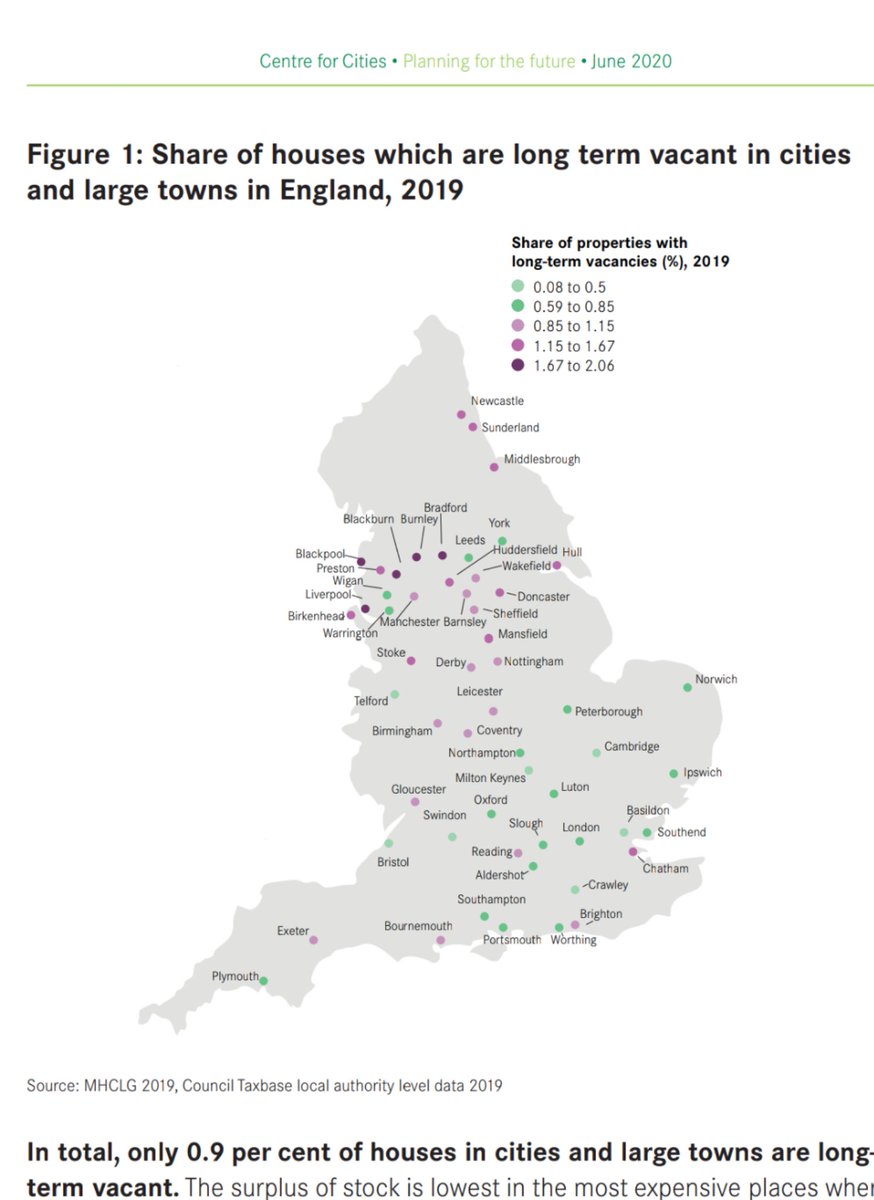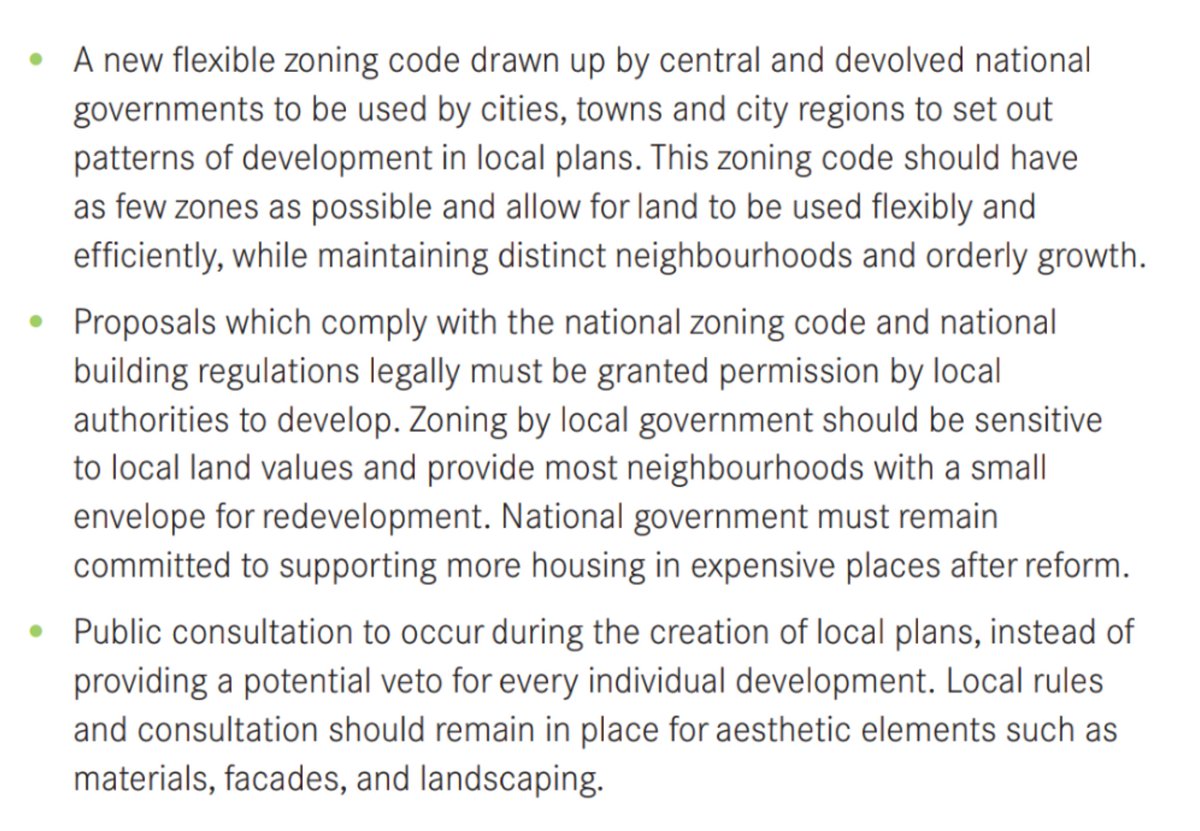My new paper on how the shortage of new homes caused by England& #39;s planning system is identical to the shortages caused by the planning system of the Soviet Union. Only a new, flexible zoning system can end the rationing of new homes and the housing crisis. https://twitter.com/CentreforCities/status/1273753609503682562?s=19">https://twitter.com/Centrefor...
This is a new framework for thinking about the housing crisis. Developed originally by the economist János Kornai to understand the economies of the former Eastern Bloc, it explains how our discretionary planning system changes everyone& #39;s behaviour to create shortage and waste.
There are obviously lots of differences between Soviet power and the English town planning system. But two crucial things are the same - planners ration inputs (steel, coal etc + land) to firms case-by-case and their systems are defined by a permanent state of shortage.
This isn& #39;t like the shortage of pasta and loo roll we all had this year, a temporary blip. Instead, the undersupply experienced by housing in England and goods in the USSR is permanent, as it emerges from the institutions of the planning system - these are "shortage economies".
Kornai& #39;s analysis actually shows that theoretically, these planning systems - discretionary, where everything is rationed by planners case-by-case - can actually work efficiently, under certain conditions. If these criteria are met, planning is as efficient as a market mechanism:
However... these conditions are so very strict they are impossible to meet, far more so than that for an efficient market outcome. So as the conditions required cannot be met, it is impossible for a discretionary planning system to work efficiently. There will always be waste.
In practice, this manifests itself in two linked but distinct types of shortages. There are vertical shortages for firms in the planning of land, which cascade down to consumers in the form of a horizontal shortage of homes.
These problems do not occur because landlords or developers are greedy, or finance does bad things. Rather, the institutional constraints discretionary planning puts upon economic activity changes the strategic behaviour of everyone involved, forcing people to create shortages.
For instance. "Land banking", where developers buy land but don& #39;t build on it, is often blamed by many planners as a key cause of the housing crisis. "We hand out planning permissions, but the greedy developers won& #39;t build!".
But think about why developers do this. Developers know that planning permissions are fundamentally uncertain. They cannot just buy a planning permission - they need to apply. If something goes wrong - the planners say no, Nimbys block it, the council changes etc, they are stuck.
So developers respond in two ways. They demand more land than they need or can use, expecting some planning permissions to fail. And then when they get permissions, they hoard them like hamsters to spread planning risk and their workload over multiple periods.
Exactly the same behaviour appeared in the Soviet economy - firms would demand more permits than they needed from planners. But the mismatch between supply and demand wasn& #39;t caused by the extra permits - it was caused by the planners& #39; discretionary rationing of inputs!
Another example, of a horizontal shortage this time. Empty homes are often blamed for the housing crisis too - understandably when homelessness is such a concerning issue. But when you think about it, you actually need a surplus of unused stuff to avoid a shortage, by definition.
But in England, there is a devastating lack of surplus homes, esp in the most expensive cities. Only 0.9% of homes are long term vacant. A higher share of homes are vacant in Tokyo (2.4%) than in Burnley (2.1%), the city with the most affordable and vacant housing in England.
To end the housing crisis, we should be building so many more new homes that the number of empty homes rises dramatically. But that& #39;s not currently possible, as the discretionary planning system rations the supply of land for development and prevents supply from meeting demand.
So how do we solve this? Our analysis is that the discretionary element in the planning system needs to be minimised. That requires shifting from our current model to a zoning system, while avoiding the problems zoning systems have experienced in the US.
Our flexible zoning proposal to change the planning system from first principles directly tackles the institutional issues discussed above, and will end the discretionary rationing of land which causes the housing crisis.
Flexible zoning will set out how land can be used in urban areas across different levels of & #39;intensity& #39;. As the intensity of the zone rises, lower-intensity uses such as suburban housing continue to be allowed.
The key is that if a developer& #39;s proposal complies with the national zone and with national building regs, it legally *must* be granted planning permission. This will end the rationing of new homes which the discretionary planning system introduces into our housing system.
A discretionary process can remain for proposals which do not comply with the zoning, but the majority of new housing will be supplied through this zoning approach.
Public consultation, heritage and nature protection can remain, but will need to be better organized and front-loaded into the beginning of the local plan process, to allow debate to weigh trade-offs and cost-benefits of preventing development.
Undeveloped land would be phased into the zoned area depending on population growth - this will resemble the current site allocation process, but with no housing targets, no discretionary rationing of sites, and no green belt.
The discretionary and arbitrary form of taxation Section 106 will be removed and replaced with a flat 20% levy on development to fund new infrastructure and affordable housing. We reckon that around London, Brum, Manchester, Bristol, and Newcastle alone this could raise £96bn+.
To conclude - I& #39;m sure there will be lots of debate about how a new system should work and I& #39;d like to hear your feedback on our ideas and critique of the system.
But at the very least, this paper shows that the housing crisis is the result of political choices, and if we want we can end it. We can choose either the inequality and poverty the current planning system creates, or we can choose something new - housing and prosperity for all.
If you want to hear and discuss more about this paper and how a new planning system would work, come to my T̶E̶D̶ ̶T̶a̶l̶k̶ launch event on Monday morning! https://twitter.com/CentreforCities/status/1273572298700861440?s=19">https://twitter.com/Centrefor...

 Read on Twitter
Read on Twitter










